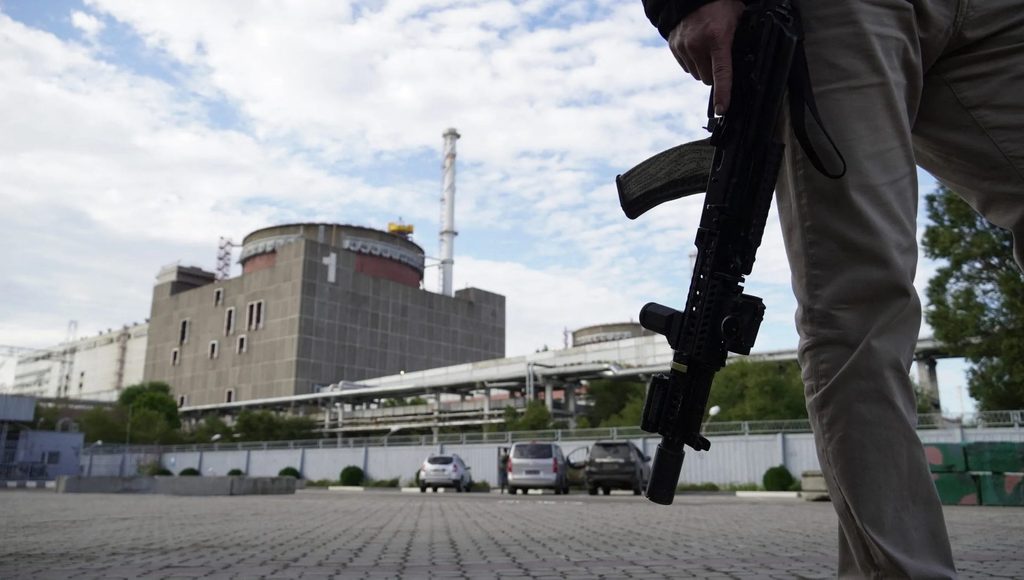Sanctions on Russia in the nuclear sector have not been supported by Western countries since the beginning of Russia’s full-scale invasion of Ukraine.
Controlling 38% of the global uranium enrichment market, 17% of nuclear fuel supplies and ranking first in the construction of nuclear power plants abroad, Russia continues to quietly develop its nuclear business, which becomes even more threatening to global security with each new project.
After all, if a country can quickly substitute Russian gas with supplies from U.S., Qatar or any other producer, such diversification does not work that fast in nuclear energy – it takes several years to switch a nuclear plant from Russian to another fuel. The longer the West waits with nuclear sanctions on Russia, the more difficult challenges it will have to face.
The activities of Rosatom at the Zaporizhzhia NPP is an example of how Russia, having gained control over the operation of a nuclear facility in any country, can blackmail the leadership of that country. If the country does not agree to vote for a specific decision at the UN General Assembly, the nuclear power plant will stop producing electricity.
If it does not agree to give its strategic reserves of minerals to (pro)Russian companies, an accident or other serious incident may unexpectedly occur at the nuclear power plant. The scenario, which for Ukrainians is obvious in the future, for many representatives of European countries is still a stunning one and seems impossible.
Meanwhile, the need for sanctions on the Russian nuclear industry is already overdue. This was repeatedly emphasized at the level of the European Parliament and individual EU member states, but these appeals – namely, to include Rosatom and many of its companies in the sanctions lists - have barely been implemented in practice.
One of the biggest advocates of including the Russian nuclear sector in the sanctions list is Germany, a country that refused from nuclear energy (the last three NPPs were finally shut down on April 15) and now supports initiatives that will allow to reduce the impact of nuclear globally in the future. It is clear that the biggest opponents are Hungary, which is completing the construction of a nuclear power plant that will be operated by Rosatom, and France, which has fruitful and long-standing cooperation with Russia in nuclear energy, and some French companies continue to develop joint plans despite the war.
The Russian companies working in the Rosatom system – over 350 of them – continue to participate in many so-called scientific projects. For example, Russia continues to actively work in such projects as ITER or INPRO. While the Russian troops shelled Ukrainian cities, ITER participants in the south of France reported the delivery of the “first poloidal field coil” exclusively from Russia with no intention of stopping any cooperation.
Likewise, the International Project on Innovative Nuclear Reactors and Fuel Cycles (INPRO), operating within the IAEA framework, continues to grant Russian companies access to modern technologies. Indeed, one can speculate that science should not stop its development, but does this science need Russia, which is already using new technologies as a weapon for a possible nuclear war?
Therefore, the first thing that is worth and must be done right now is to remove Russians and Russian companies from all scientific research projects conducted in the nuclear sector. You will never be certain that the acquired scientific knowledge will not turn a “peaceful atom” into another nuclear weapon.
Likewise, Russia’s influence in the IAEA has not yet been affected by sanctions. It is difficult to imagine how an organization that is supposed to be as impartial as possible and to tell the world the truth about situation at the Zaporizhzhia NPP can actually do it while still having Russian representatives among key executives.
As an example, Mikhail Chudakov, Deputy Director General and Head of the Department of Nuclear Energy, remains in his position. To what extent can we hope that the department chaired by a Russian will draft a decision that will be against Russia? Therefore, the next step in the nuclear sanctions policy is to get rid of Russian influence on the leadership of specialized international organizations.
For sure, it will be much more difficult to remove Russia from the markets of uranium enrichment and nuclear fuel supply. Quick decisions and additional investments are needed for those companies that can replace Rosatom in existing and future projects. It is quite possible to replace Russian nuclear fuel assemblies with other manufacturers – Ukraine’s experience has proven this.
In order to encourage the EU countries to refuse cooperation with Russia, it is not even necessary to introduce sanctions – it is enough to make changes to the REPowerEU plan, declaring the transition from Russian nuclear technologies to alternative ones in a clearly defined time perspective. Just as it was done in the field of natural gas.
In addition to existing commitments, Russia is actively expanding the geography of its influence by signing memoranda of cooperation where the construction of nuclear plants is planned. As of today, Rosatom plans to build over 30 reactors abroad. So far, the riskiest project with regard to the Russia’s future influence is the Akkuyu NPP construction in Türkiye, where Rosatom implements the project under the BOO (build-own-operate) model, and then can have a significant influence on the decision-making of Turkish authorities, including political decisions.
It is no longer a secret - such a network of nuclear power plants can easily turn into a network of using nuclear energy as a weapon when it is convenient for Russia. Yet even in such projects Russia can be replaced if the process of replacing one contractor with another starts in time. In fact, France has already begun to do this – the country’s agreements with China and Hungary are one of the examples that are trying to push Russia out of the international market.
Can the European Union stop Rosatom in its existing and future projects, especially in third countries? Yes, it is the EU that can do it. Rosatom still orders the “brains” of nuclear plants, which are instrumentation and control systems for new nuclear reactors, from European companies, in particular from the Germany-based Siemens and the France-based Framatom. With other French companies, such as Assystem, Rosatom has a long-term partnership in the form of consulting and engineering support for the design and commissioning of NPPs.
The Russians are very proud of their cooperation with French and German companies, and when they participate in international tenders for the construction of nuclear power plants, they often demonstrate how they can attract the best partners. If such cooperation is suspended, Rosatom will hardly have the ability to build any nuclear power plant “from scratch”, let alone compete with other companies. Import substitution, i.e. the development of its own technological solutions, can take years.
To do this, European companies can be prohibited at the EU level from supplying equipment to those projects where Russian companies or Russian personnel are among the contractors, or those having signs of Russian funding.
In fact, Germany has already begun to curtail such cooperation – recently Siemens did not get permission to supply the necessary equipment for the NPP construction in Hungary. However, France is not yet going to stop its business cooperation with the Russians.
On top of that, it was reported that Framatome was going to build facilities for the production of fuel assemblies for VVER reactors in Germany. This probably means that the company received the appropriate license and permits from Rosatom. It is unlikely that German communities will approve such an initiative, but the very fact that French business is going to continue production using Russian technologies is upsetting.
Sanctions on the Russian nuclear industry can and should be imposed – to this end, the EU must make a political decision and arrange everything in a correct way. Time is in Russia's favour in this case, and the later the EU and the international community realize this, the more difficult it will be to fight Russian nuclear terrorism in the future.


